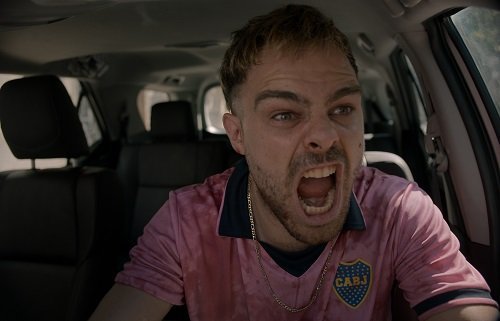Film Review: “4×4” — Pedal to the Metal
By Tim Jackson
Despite its potential for black comedy or moral sermonizing, 4×4 remains a gripping suspenser.
4×4, directed and co-written (with Gastón Duprat) by Mariano Cohn. Available on VoD.

Peter Lanzaniis is caught mid-panic in a scene from 4×4.
Remember My Mother the Car, The Love Bug, and Stephen King’s Christine? Today’s autos have become far more intelligent — and diabolical. The wonder car in 4×4, the new, claustrophobic thriller from Argentine director Mariano Cohn, is an elaborately customized SUV that has been painstakingly designed as a hermetic trap to catch and hold a hapless thief. The goal: to subject him to slow justice. The owner of the vehicle is a disgruntled obstetrician who, when not delivering cute babies, has spent a lot of his spare time coming up with this hell on four wheels. The vehicle has unbreakable windows, a soundproof interior, mirrored one-way windows, remote controlled heat and air conditioning, and a two-way radio. You can break in — but you can’t break out.
Into this device stumbles a young thief named Ciro, played by Peter Lanzaniis. For kicks, or perhaps to mark his territory in canine fashion, he pisses into the back seat — only to then discover there is no way out. He kicks at the windows, rips apart the doors, and even tries to shoot out the glass. The bullet ricochets back into his leg. He is left screaming into a void. Suddenly, an incoming call is heard on the car’s radio. The voice is that of Dr. Enrique Ferrari who, after a greeting that oozes disingenuous charm, reveals his vigilante intentions. He has been robbed 27 times and this, he explains, is his retribution. A random theft intent on stealing the car’s stereo has been issued a death sentence.
Throughout the ordeal, Dr. Ferrari returns to the air waves to calmly read snippets of the latest world news or describe his own middle-class frustrations. The defeated Ciro is clamoring for water. Spicing up his sadistic agenda with added psychological torment, Dr. Ferrari says he knows all about his victim’s personal background and life of petty crime. “You did so little to have such a beautiful family,” he observes with concern. The contrast between their lives gives Cohn an opportunity to incorporate commentary on issues of social justice and class privilege. Like other recent films from Argentina, 4×4 fashions itself as an exercise in social and political critique; this is a discomforting thriller that also poses serious questions about the power of crime and punishment. Films like XXY (2007) The Secret in their Eyes (2009), The Man Next Door (2009) Wild Tales (2014), and Zama (2017) excavate Argentina’s historical memory, examining class conflict, political corruption, repression, and bureaucratic finagling. In 4×4, vigilante justice is put under the microscope. Who is the real criminal? Does the punishment fit the crime?
Lanzaniis, who is in every shot, convincingly navigates his way through a range of agonized emotions: pain after he is hit by a ricocheting bullet, the discomfort of dealing with relentless heat and thirst. When the air conditioning is remotely activated he has to withstand freezing cold. Ciro watches daily life pass by: it ranges from small muggings to a couple screwing up against the car window one night. Ingenious and horrific, 4×4 also becomes outrageous to the point of absurdity. Through it all, Lanzaniis’ aching performance manages to keep the madness grounded in realism, even when the situation goes comically over the top. Ciro is determined to survive: he rips up the seats to cover the air conditioner and applies a tourniquet to his leg to staunch a bullet wound. He is ravenously hungry and crazy with thirst. The thief even contemplates eating his only passenger, a tiny cricket.
Despite its potential for black comedy or moral sermonizing, 4×4 remains a gripping suspenser. The screenplay, co-written by Cohn and Gastón Duprat, keeps the stakes high via imaginative frustrations, near escapes, and unexpected surprises. Still, the specter of voyeurism looms. Does the pitiless hubris of one man — acting as judge, jury, and executioner — end up inspiring empathy for his helpless prey as we watch him struggle? When does schadenfreude degenerate into a sick power play? Is revenge, bent on maximizing fear and torment, ever about more than ego? Those with money and power decide (far too often) how, when, and whom to punish. When it comes to justice, money rules, and not just in Argentina. Without revealing the striking conclusion, suffice to say that, after this ride to nowhere, you will be asking questions about where the world’s wheels are headed.
Tim Jackson was an assistant professor of Digital Film and Video for 20 years. His music career in Boston began in the 1970s and includes some 20 groups, recordings, national and international tours, and contributions to film soundtracks. He studied theater and English as an undergraduate, and has also worked helter skelter as an actor and member of SAG and AFTRA since the 1980s. He has directed four feature documentaries: Chaos and Order: Making American Theater about the American Repertory Theater; Radical Jesters, which profiles the practices of 11 interventionist artists and agit-prop performance groups; When Things Go Wrong: The Robin Lane Story; Joan Walsh Anglund: Life in Story and Poem; and the short film The American Gurner. He is a member of the Boston Society of Film Critics. You can read more of his work on his blog.
